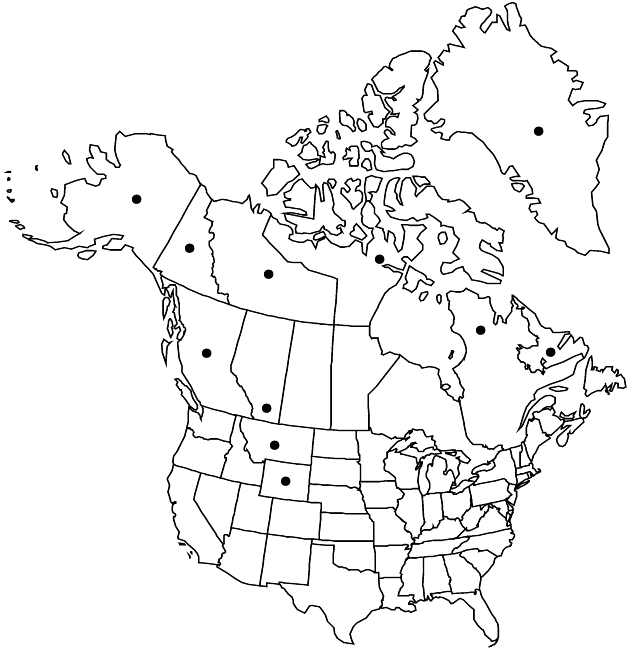familyAsteraceae
genusAntennaria
speciesAntennaria monocephala
subspeciesAntennaria monocephala subsp. angustata
Difference between revisions of "Antennaria monocephala subsp. angustata"
Ark. Bot., n. s. 7: 135. 1968.
Common names: Narrow-leaved pygmy pussytoes antennaire étroite
Basionym: Antennaria angustata Greene Pittonia 3: 284. 1898
Synonyms: Antennaria alpina var. megacephala (Fernald ex Raup) S. L. Welsh Antennaria burwellensis Malte Antennaria congesta Malte Antennaria fernaldiana Polunin Antennaria hudsonica Malte Antennaria megacephala Fernald ex Raup Antennaria pygmaea Fernald Antennaria tansleyi Polunin Antennaria tweedsmuirii Polunin
Treatment appears in FNA Volume 19. Mentioned on page 390, 412.
FNA>Volume Importer |
FNA>Volume Importer |
||
| Line 11: | Line 11: | ||
|name=Antennaria angustata | |name=Antennaria angustata | ||
|authority=Greene | |authority=Greene | ||
| + | |rank=species | ||
|publication_title=Pittonia | |publication_title=Pittonia | ||
|publication_place=3: 284. 1898 | |publication_place=3: 284. 1898 | ||
| Line 17: | Line 18: | ||
|name=Antennaria alpina var. megacephala | |name=Antennaria alpina var. megacephala | ||
|authority=(Fernald ex Raup) S. L. Welsh | |authority=(Fernald ex Raup) S. L. Welsh | ||
| + | |rank=variety | ||
}} {{Treatment/ID/Synonym | }} {{Treatment/ID/Synonym | ||
|name=Antennaria burwellensis | |name=Antennaria burwellensis | ||
|authority=Malte | |authority=Malte | ||
| + | |rank=species | ||
}} {{Treatment/ID/Synonym | }} {{Treatment/ID/Synonym | ||
|name=Antennaria congesta | |name=Antennaria congesta | ||
|authority=Malte | |authority=Malte | ||
| + | |rank=species | ||
}} {{Treatment/ID/Synonym | }} {{Treatment/ID/Synonym | ||
|name=Antennaria fernaldiana | |name=Antennaria fernaldiana | ||
|authority=Polunin | |authority=Polunin | ||
| + | |rank=species | ||
}} {{Treatment/ID/Synonym | }} {{Treatment/ID/Synonym | ||
|name=Antennaria hudsonica | |name=Antennaria hudsonica | ||
|authority=Malte | |authority=Malte | ||
| + | |rank=species | ||
}} {{Treatment/ID/Synonym | }} {{Treatment/ID/Synonym | ||
|name=Antennaria megacephala | |name=Antennaria megacephala | ||
|authority=Fernald ex Raup | |authority=Fernald ex Raup | ||
| + | |rank=species | ||
}} {{Treatment/ID/Synonym | }} {{Treatment/ID/Synonym | ||
|name=Antennaria pygmaea | |name=Antennaria pygmaea | ||
|authority=Fernald | |authority=Fernald | ||
| + | |rank=species | ||
}} {{Treatment/ID/Synonym | }} {{Treatment/ID/Synonym | ||
|name=Antennaria tansleyi | |name=Antennaria tansleyi | ||
|authority=Polunin | |authority=Polunin | ||
| + | |rank=species | ||
}} {{Treatment/ID/Synonym | }} {{Treatment/ID/Synonym | ||
|name=Antennaria tweedsmuirii | |name=Antennaria tweedsmuirii | ||
|authority=Polunin | |authority=Polunin | ||
| + | |rank=species | ||
}} | }} | ||
|hierarchy=Asteraceae;Asteraceae tribe Gnaphalieae;Antennaria;Antennaria monocephala;Antennaria monocephala subsp. angustata | |hierarchy=Asteraceae;Asteraceae tribe Gnaphalieae;Antennaria;Antennaria monocephala;Antennaria monocephala subsp. angustata | ||
| Line 56: | Line 66: | ||
|elevation=0–2900 m | |elevation=0–2900 m | ||
|distribution=Greenland;Alta.;B.C.;Nfld. and Labr. (Labr.);N.W.T.;Nunavut;Que.;Yukon;Alaska;Mont.;Wyo. | |distribution=Greenland;Alta.;B.C.;Nfld. and Labr. (Labr.);N.W.T.;Nunavut;Que.;Yukon;Alaska;Mont.;Wyo. | ||
| − | |discussion=<p>Subspecies angustata is apomictic and has a wider geographic range than the amphimictic < | + | |discussion=<p>Subspecies angustata is apomictic and has a wider geographic range than the amphimictic <i></i>subsp.<i> monocephala</i>. It is easily recognized by heads borne singly, dark phyllaries, and gynoecious population structure.</p> |
|tables= | |tables= | ||
|references= | |references= | ||
| Line 65: | Line 75: | ||
-->{{#Taxon: | -->{{#Taxon: | ||
name=Antennaria monocephala subsp. angustata | name=Antennaria monocephala subsp. angustata | ||
| − | |||
|authority=(Greene) Hultén | |authority=(Greene) Hultén | ||
|rank=subspecies | |rank=subspecies | ||
| Line 80: | Line 89: | ||
|publication year=1968 | |publication year=1968 | ||
|special status= | |special status= | ||
| − | |source xml=https://jpend@bitbucket.org/aafc-mbb/fna-data-curation.git/src/ | + | |source xml=https://jpend@bitbucket.org/aafc-mbb/fna-data-curation.git/src/eaa6e58056e40c9ef614d8f47aea294977a1a5e9/coarse_grained_fna_xml/V19-20-21/V19_672.xml |
|tribe=Asteraceae tribe Gnaphalieae | |tribe=Asteraceae tribe Gnaphalieae | ||
|genus=Antennaria | |genus=Antennaria | ||
Revision as of 19:21, 16 December 2019
Gynoecious (staminate plants unknown). Stems usually stipitate-glandular. Basal leaves spatulate to oblanceolate, faces usually gray-pubescent, adaxial sometimes green-glabrescent. 2n = 56, 60?, 70.
Phenology: Flowering summer.
Habitat: Moist tundra, disturbed margins of solifluction lobes, unstable, gravelly slopes
Elevation: 0–2900 m
Distribution

Greenland, Alta., B.C., Nfld. and Labr. (Labr.), N.W.T., Nunavut, Que., Yukon, Alaska, Mont., Wyo.
Discussion
Subspecies angustata is apomictic and has a wider geographic range than the amphimictic subsp. monocephala. It is easily recognized by heads borne singly, dark phyllaries, and gynoecious population structure.
Selected References
None.
Lower Taxa
None.